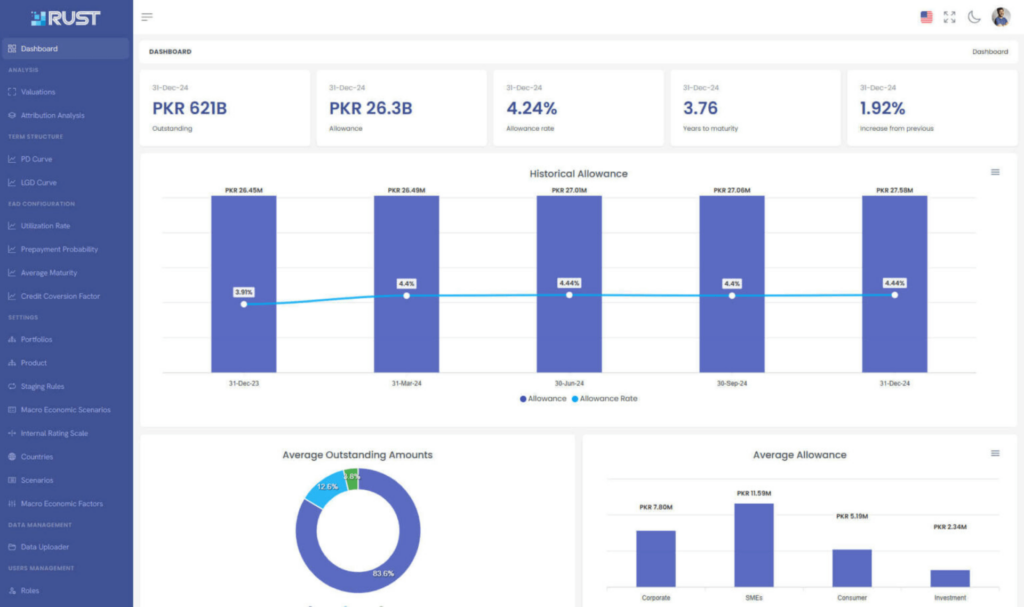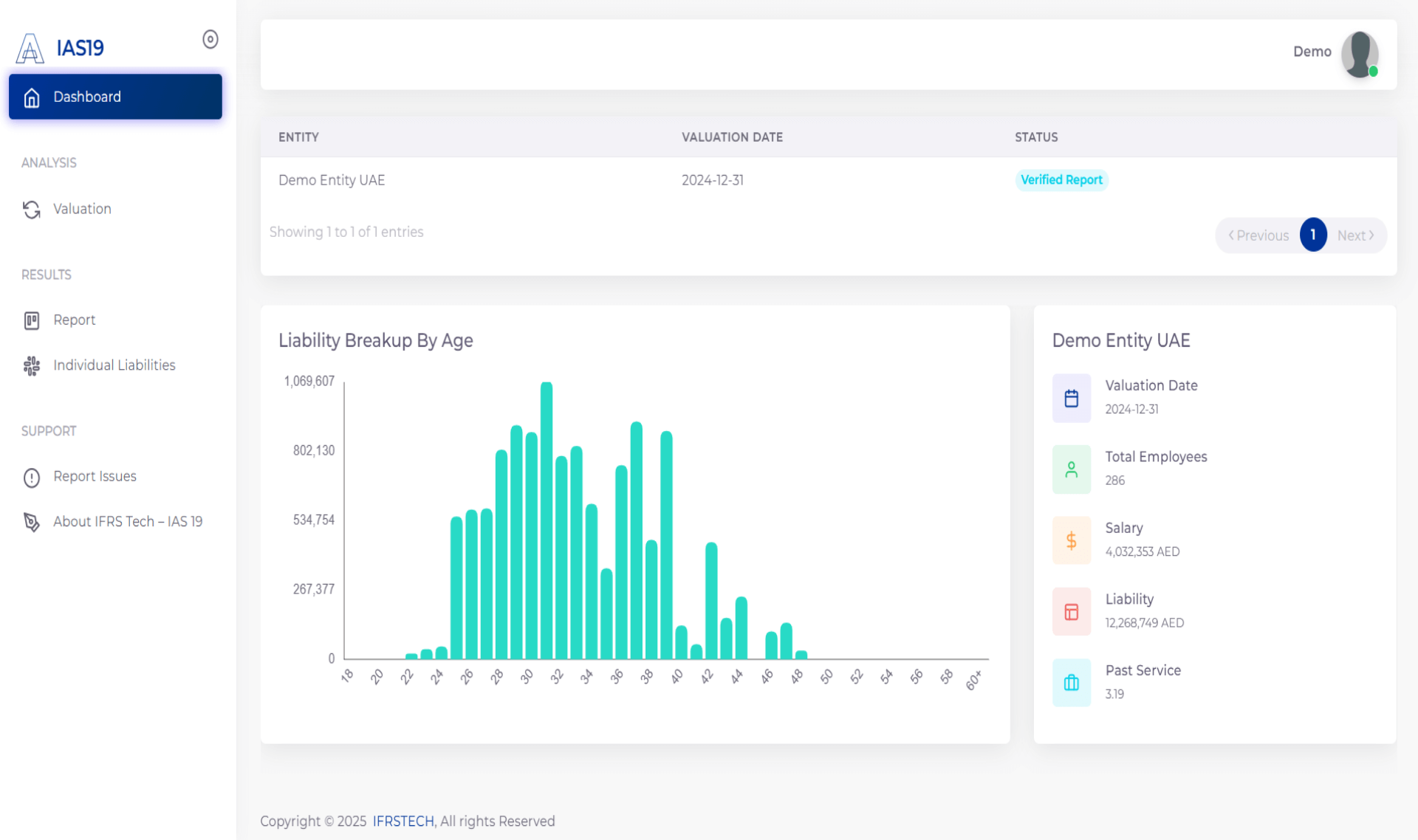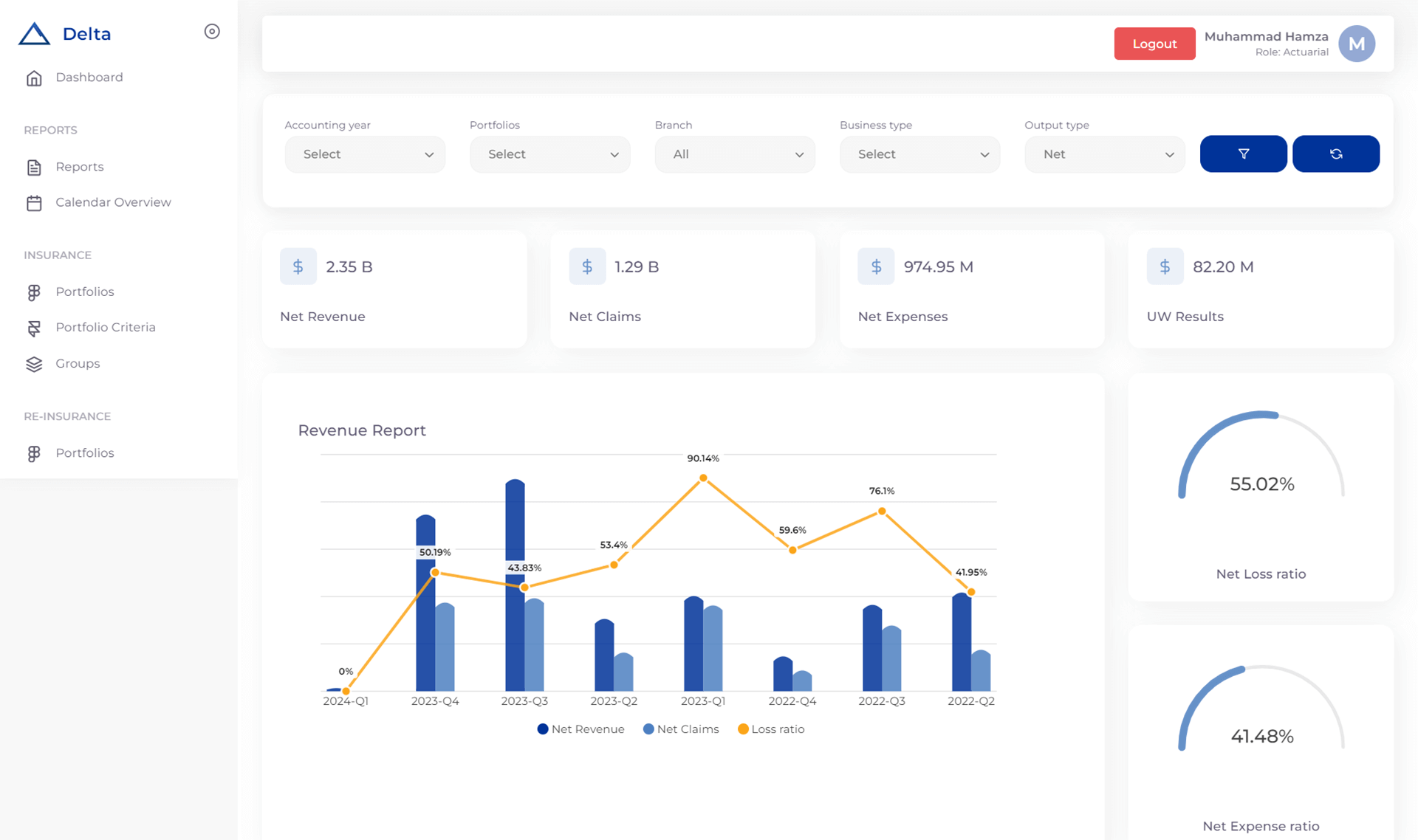- +966 55 091 9817
- [email protected]
- 7500, AL-Badar, 2900, Al-Khobar, KSA
Streamline IFRS 9 compliance for financial instruments, including expected credit loss (ECL) calculations, with Rust IFRS 9 compliance software, a comprehensive, end-to-end solution.


This IFRS 9 Software directly integrates with all major banking systems, bypassing manual data uploads with fully automated APIs that sync seamlessly.
Rust eliminates the need for Excel sheets and CSV files, ensuring efficient data management across each reporting period.
With an intuitive interface, Rust IFRS 9 enables users to construct complete Probability of Default (PD) term structures through advanced statistical models.
This feature streamlines the term structure development process, enhancing ECL calculation accuracy for IFRS 9 compliance.
Rust offers a highly adaptable staging rules module that accommodates complex scenarios, including contagion effects and cooling-off periods.
This ensures that credit risk staging aligns accurately with IFRS 9 requirements, improving compliance and transparency.
Rust's powerful attribution analysis tools enable users to track ECL changes precisely across different valuation periods.
This detailed insight allows a better understanding of the effects of term structures, staging rule adjustments, and data changes on ECL outcomes.
This state-of-the-art IFRS 9 Analytics Software dashboard delivers visual insights into historical provisions, segment breakdowns, and stage assessments.
CXOs can customize KPIs to fit their strategic objectives, supporting informed decision-making and regulatory reporting.
Rust IFRS 9 software ensures a transparent, auditable approach to ECL modeling with open access to data and calculations.
This feature gives financial institutions complete control over every detail of the credit loss calculation process, enhancing IFRS 9 compliance.
Rust supports the entire lifecycle of financial instruments from initial recognition to final reporting, incorporating macroeconomic factors and multi-scenario analyses.
This comprehensive modeling enables full compliance with IFRS 9 classification and measurement standards.
Rust IFRS 9 software provides end-to-end visibility into ECL calculations, ensuring compliance with all IFRS 9 requirements.
This transparency is essential for accurate monitoring and reporting, especially for complex financial assets.
Rust enables in-depth reconciliation between initial and final ECL values, accurately depicting credit loss fluctuations over time.
This feature is critical for institutions needing to maintain IFRS 9 compliance with a focus on accurate financial reporting.
Rust IFRS 9 can be deployed on-premise or via the cloud, seamlessly adapting to an institution's IT infrastructure.
This flexibility allows a smooth transition, accommodating diverse operational and security requirements.
Rust IFRS 9 software incorporates advanced security protocols, including role-based access and multi-factor authentication, to safeguard sensitive financial data.
This robust security framework meets IFRS 9 standards and aligns with broader industry requirements.
Rust IFRS 9 extends beyond software delivery by providing thorough training on IFRS 9 adoption, ECL modeling, and compliance strategies.
This support empowers financial institutions to maintain a competitive edge in IFRS 9 financial instrument management and credit risk compliance.
With advanced modeling capabilities and integrated macroeconomic factors, Rust IFRS 9 ensures precise ECL estimates.
This accuracy supports detailed financial representation, meeting IFRS 9 requirements.
Rust IFRS 9's robust security features protect sensitive data from unauthorized access and the likelihood of human error.
This risk mitigation ensures operational integrity and safeguards financial information.
Rust IFRS 9 covers all IFRS 9 ECL modeling aspects to ensure compliance with stringent regulations.
This adherence strengthens financial resilience across compliance cycles.
By reducing manual labor, Rust IFRS 9 Automation capabilities lower operational costs.
These efficiencies translate into significant savings for financial institutions.
Rust IFRS 9's advanced technology provides a competitive edge in IFRS 9 compliance.
Its comprehensive features empower institutions to navigate complex regulatory landscapes confidently.
With versatile calibration and reporting options, Rust IFRS 9 scales with your institution's growth.
Customizable parameters and adaptable frameworks support both initial implementation and long-term compliance.
Rust IFRS 9 offers in-depth training on IFRS 9 principles, including ECL computations and hedge effectiveness.
This ensures your team is well-prepared to meet evolving IFRS 9 standards confidently.
Rust IFRS 9 provides complete visibility into cash flows and ECL calculations, which is essential for regulatory compliance.
This transparency enhances financial reporting, supporting stakeholder trust.
In-depth reconciliation and reporting features in Rust IFRS 9 enable data-driven decision-making.
These insights are vital for managing credit risk and strategic financial planning.
Rust IFRS 9 significantly reduces manual effort for ECL calculations, streamlining compliance workflows.
This IFRS 9 automation frees up valuable resources for other critical tasks, increasing overall efficiency.


















Expected Credit Loss (ECL) modeling in Rust IFRS 9 is critical for estimating potential credit losses based on historical data, current economic conditions, and future forecasts. By following IFRS 9 standards, Rust IFRS 9 ensures transparent, proactive credit loss assessments, enhancing accuracy in financial reporting and strengthening overall credit risk management.
Rust IFRS 9 provides adaptable and scalable compliance solutions tailored for banks, insurers, asset managers, and other financial institutions. With advanced tools for loan staging, impairment calculations, Expected Credit Loss (ECL) modeling, and hedge accounting, Rust IFRS 9 offers end-to-end support for diverse compliance needs, maximizing operational efficiency while keeping you aligned with IFRS 9 standards.
Yes, Rust IFRS 9 includes comprehensive training resources to cover essential IFRS 9 concepts, such as asset impairment, credit risk analysis, and hedge accounting. Our training empowers your team to manage IFRS 9 compliance processes confidently, supporting your institution’s commitment to regulatory adherence and accuracy.
Absolutely. Rust IFRS 9 is built with flexibility, adapting to the latest IFRS 9 regulatory updates and compliance requirements. This adaptability ensures that your institution remains fully compliant with evolving standards, safeguarding your reporting accuracy and operational efficiency over time.
IFRS 9 models specify the classification and measurement of financial assets, financial liabilities, and some contracts to buy or sell non-financial items. These models are vital for determining how assets are valued, how losses are calculated, and how risks are managed within a framework that prioritizes transparency and regulatory compliance.
Rust IFRS 9 utilizes a formula for calculating Expected Credit Loss (ECL): ECL = Probability of Default (PD) x Loss Given Default (LGD) x Exposure at Default (EAD). This approach ensures precise and accurate ECL estimates, aligning your institution with IFRS 9’s stringent requirements for credit risk management and loss provisioning.
IFRS 9 is a regulatory standard that reshapes how banks measure Expected Credit Loss (ECL) and manage credit risk. By providing flexible approaches to ECL measurement, IFRS 9 encourages banks to adapt their models based on individual circumstances, enhancing compliance and risk transparency in financial reporting.
IFRS 9 stands for the International Financial Reporting Standard 9, a global regulation that sets the framework for the classification, measurement, and impairment of financial assets and liabilities. Its focus is on improving transparency, credit risk management, and the quality of financial reporting.
The IFRS 9 impairment model, implemented through Rust IFRS 9, requires financial institutions to recognize expected credit losses on financial assets from initial recognition. This model relies on ECL estimates to assess asset impairment risk, helping institutions respond more proactively to potential credit losses.
IFRS 9 hedge accounting is a set of regulations that enables institutions to align their risk management strategies with their financial reporting. By allowing financial assets and liabilities to be measured in tandem, hedge accounting provides a clearer picture of risk exposure and reduces volatility in profit and loss reporting.
In IFRS 9, the Probability of Default (PD) represents the likelihood that a borrower will default on a loan within a specified period. For example, a PD of 5% indicates a 5% chance of default. PD is a core component of Expected Credit Loss (ECL) modeling and supports precise credit loss forecasting.
IFRS 9 was introduced to address the limitations of its predecessor, IAS 39, particularly in transparency and timely loss recognition. By adopting forward-looking credit risk assessment methods, IFRS 9 strengthens the ability of financial institutions to respond to economic changes, thereby enhancing the reliability and clarity of financial statements.
Rust IFRS 9’s compliance software is built to meet the needs of both small businesses and large financial institutions. With automation features for credit loss calculations, classification, and impairment modeling, Rust IFRS 9 enables institutions to comply with IFRS 9 standards efficiently, regardless of size, boosting accuracy and transparency.
The IFRS 9 SPPI test (Solely Payments of Principal and Interest) assesses whether a financial asset’s cash flows consist solely of principal and interest payments. Assets passing this test are classified as eligible for amortized cost measurement, aiding institutions in accurate financial reporting and alignment with IFRS 9 standards.
Rust IFRS 9 supports hedge accounting by aligning risk management practices with accounting requirements. This enables institutions to reduce volatility in financial statements and better reflect their risk management strategies, particularly with tools for identifying and managing hedging relationships.
IFRS 9 became effective on January 1, 2018. Since then, financial institutions must comply with IFRS 9 standards for classifying, measuring, and managing financial assets, liabilities, and credit risks, marking a shift toward more proactive and transparent reporting practices.
Rust IFRS 9 incorporates advanced credit risk analysis tools, enabling financial institutions to assess and manage credit risk accurately. By automating ECL calculations and integrating real-time data, Rust IFRS 9 ensures regulatory compliance, mitigates credit risk, and enhances transparency in credit loss reporting.
IFRS 9 is essential for establishing a unified global approach to financial asset management, credit risk, and impairment calculations. By encouraging proactive risk assessments, IFRS 9 enhances the quality of financial reporting, ensuring accuracy and clarity, and enables stakeholders to make more informed decisions.
Loss Given Default (LGD) in IFRS 9 refers to the proportion of a loan that would not be recovered if the borrower defaults. This is a crucial element in Expected Credit Loss (ECL) calculations, as it helps institutions quantify potential losses and adjust risk models accordingly.
Rust IFRS 9 is built to help institutions fully comply with IFRS 9 regulatory standards. From automated ECL modeling and impairment calculations to hedge accounting and comprehensive credit risk analysis, Rust IFRS 9 covers all IFRS 9 requirements, providing a streamlined approach to financial reporting.
This IFRS 9 Software directly integrates with all major banking systems, bypassing manual data uploads with fully automated APIs that sync seamlessly.
Rust eliminates the need for Excel sheets and CSV files, ensuring efficient data management across each reporting period.
Rust offers a highly adaptable staging rules module that accommodates complex scenarios, including contagion effects and cooling-off periods.
This ensures that credit risk staging aligns accurately with IFRS 9 requirements, improving compliance and transparency.
This state-of-the-art IFRS 9 Analytics Software dashboard delivers visual insights into historical provisions, segment breakdowns, and stage assessments.
CXOs can customize KPIs to fit their strategic objectives, supporting informed decision-making and regulatory reporting.
Rust supports the entire lifecycle of financial instruments from initial recognition to final reporting, incorporating macroeconomic factors and multi-scenario analyses.
This comprehensive modeling enables full compliance with IFRS 9 classification and measurement standards.
Rust enables in-depth reconciliation between initial and final ECL values, accurately depicting credit loss fluctuations over time.
This feature is critical for institutions needing to maintain IFRS 9 compliance with a focus on accurate financial reporting.
Rust IFRS 9 software incorporates advanced security protocols, including role-based access and multi-factor authentication, to safeguard sensitive financial data.
This robust security framework meets IFRS 9 standards and aligns with broader industry requirements.
With an intuitive interface, Rust IFRS 9 enables users to construct complete Probability of Default (PD) term structures through advanced statistical models.
This feature streamlines the term structure development process, enhancing ECL calculation accuracy for IFRS 9 compliance.
Rust's powerful attribution analysis tools enable users to track ECL changes precisely across different valuation periods.
This detailed insight allows a better understanding of the effects of term structures, staging rule adjustments, and data changes on ECL outcomes.
Rust IFRS 9 Software empowers users to analyze expected credit losses at the most granular level, including facility-level ECL allowances.
With detailed cashflows and PD, LGD, and EAD calculations, Rust provides unmatched depth in IFRS 9 financial instrument analysis.
Rust IFRS 9 software ensures a transparent, auditable approach to ECL modeling with open access to data and calculations.
This feature gives financial institutions complete control over every detail of the credit loss calculation process, enhancing IFRS 9 compliance.
Rust IFRS 9 can be deployed on-premise or via the cloud, seamlessly adapting to an institution's IT infrastructure.
This flexibility allows a smooth transition, accommodating diverse operational and security requirements.
Rust IFRS 9 software provides end-to-end visibility into ECL calculations, ensuring compliance with all IFRS 9 requirements.
This transparency is essential for accurate monitoring and reporting, especially for complex financial assets.
Rust IFRS 9 extends beyond software delivery by providing thorough training on IFRS 9 adoption, ECL modeling, and compliance strategies.
This support empowers financial institutions to maintain a competitive edge in IFRS 9 financial instrument management and credit risk compliance.